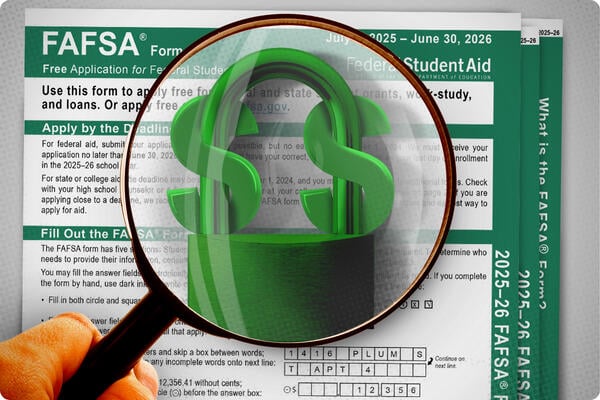
Scholarship Providers Say Data-Sharing Confusion Delays Aid
Students’ FAFSA information has become harder for scholarship providers to access because of colleges’ concerns about data privacy.
Photo illustration by Justin Morrison/Inside Higher Ed | malerapaso and sdominick/E+/Getty Images
The Native Forward Scholars Fund, a scholarship provider for Native American students, typically doles out aid to about 1,300 students per year through 40 different scholarship programs. But this year, those funds were delayed; students started fall classes without knowing how much scholarship money was coming their way.
The holdup stemmed from a breakdown in information-sharing between scholarship providers and colleges—a by-product of changes to the Free Application for Federal Student Aid. The Education Department transitioned last year to the Student Aid Index, a new financial aid eligibility formula that inputs some data directly from the Internal Revenue Service, rather than having students fill it out themselves. As a result, some pieces of information on the FAFSA are now subject to IRS privacy rules, not the Education Department’s, adding extra layers of restrictions and creating confusion for financial aid offices about what data they can and can’t share with scholarship providers and other outsiders.
A report from the National Association of Student Financial Aid Administrators, based on a survey of at least 89 financial aid staff members from a variety of institutions in January, found that only 58 percent were willing to share federal income tax data from the FAFSA with scholarship-granting organizations—with student consent—and 22 percent said they would never share this information, even with student consent. A little over 70 percent said they would share with scholarship-granting organizations FAFSA data that didn’t come from the IRS, and 11 percent would never share such data. Meanwhile, 22 percent reported ending or modifying data-sharing agreements with scholarship programs, foundations and other outside entities because of data-sharing changes during the 2024–25 aid year.
“Generally speaking, anytime a financial aid office was at all confused or uncertain about what information they could share with who, they really just locked down the data,” said Sarah Austin, a policy analyst at NASFAA.
Angelique Albert, CEO of Native Forward, said that’s been her experience as well.
“What we are seeing on our end is such a significant pushback from all of the institutions where they are not willing to provide this information to us,” she said.
The result has been a slower, more involved process to get information out of colleges, including sometimes sending students to financial aid offices to help request it, which puts an “extra burden” on the students, she added. She emphasized that the lag has an especially negative impact on Native students, who disproportionately struggle to afford college.
Financial constraints are “the No. 1 barrier for our students,” Albert said. “Delay in funding can jeopardize their ability to attend college at all.”
Other scholarship providers have had similar struggles accessing student financial data they need to determine awards, particularly students’ cost of attendance, financial aid award details and unmet need, Jackie Bright, president and CEO of the National Scholarship Providers Association, told Inside Higher Ed in an email.
“When that information is delayed or inaccessible, it can postpone scholarship disbursements or create uncertainty for students trying to plan their college finances,” Bright said.
Seeking Solutions
Up until last week, the Education Department offered “piecemeal” guidance to colleges about what data could be shared with whom and how after changes to the FAFSA, but there wasn’t any formal written guidance about sharing federal income tax information, Austin said.
A recent Dear Colleague letter addressed how to handle this bucket of data, noting that, with student consent, colleges can share federal income tax and other data on the FAFSA with scholarship-granting organizations. The Dear Colleague letter also reiterated that two designated scholarship organizations, the United Negro College Fund and the Hispanic Scholarship Fund, can receive tax information directly from the Department of Education without student consent.
But the document also left questions unanswered, Austin said. Notably, it said ED plans to roll out a new set of security standards for those accessing federal income tax data, including colleges, state agencies and scholarship providers, but the details haven’t come out yet.
“While we are glad to have some written, formal guidance … we are really looking at this as the start of the conversation, not really the final piece of information we need,” Austin said.
Bright said the guidance clarifies existing rules but doesn’t really fix the issues scholarship providers have been having. FAFSA and tax data “remain tightly protected under federal law”; re-disclosing IRS data to scholarship providers still requires written student consent, and now there are new standards looming.
She would like to see higher ed institutions put in place more streamlined processes for students to consent to sharing their financial information with scholarship providers. And she hopes federal officials find ways to “simplify and standardize secure data-sharing frameworks that respect privacy while supporting the students these programs are designed to help.”
“For scholarship providers, this means there’s not yet much immediate relief—the guidance confirms that only a few designated national organizations can receive FAFSA data directly, while others must continue to work through schools with student authorization,” Bright said. “We expect continued questions from members as they interpret how to comply under the new structure.”
Albert said she doesn’t want to see data-sharing challenges between scholarship providers and institutions pose another obstacle for students already struggling to get to and through college.
“It only makes sense to strengthen those partnerships and continue to reduce barriers for students instead of increasing them,” she said.
Source link



